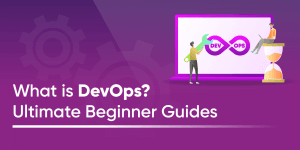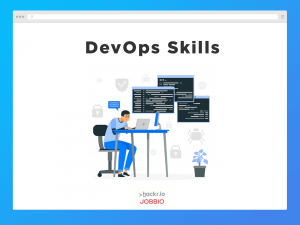The community at Hackr.io understands the need for a reliable Java IDE. In response to its immense popularity (Java ranked as #7 in the latest Stack Overflow developer survey), we evaluated and ranked the 10 best Java IDEs (Integrated Development Environments).
This choice matters. Programmers rely on their preferred Java IDE to create robust and secure desktop, enterprise, mobile, and web apps. And, when it comes to Java development, the best Java IDE can be an amazing tool to boost productivity by combining core development tasks like editing code, building executables, and debugging in a single application.
That said, how do you evaluate one Java IDE against another? The answer is simple. You need a solid Java IDE Comparison. Read on to see exactly how each stacks up.
Whether you’re a Java beginner, a mobile app developer, or an experienced Java engineer, we’ve got you covered. Let's dive into the ten best Java IDEs in 2023!
Excited to find an IDE, but want to learn Java? Check out the Java Programming Masterclass.
Top 10 Best Java IDEs
1. Intellij IDEA
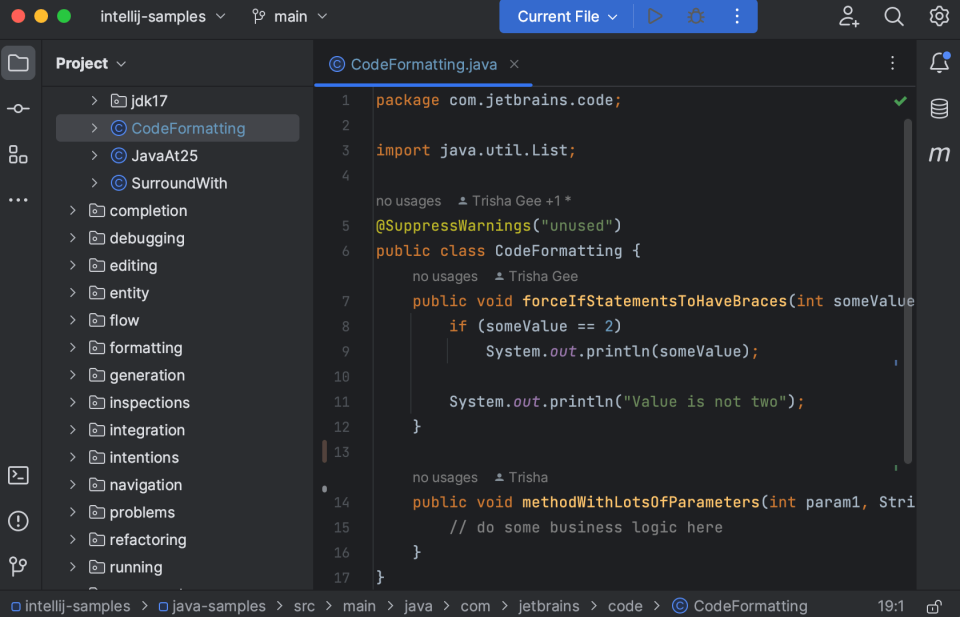
IntelliJ IDEA from JetBrains is far and away one of the most popular Java IDEs in 2023 that’s been around for over 20 years. Not to be mistaken for the best code editor for Java, this is a fully-fledged, professional development environment.
You get two flavors to choose from, the free Community Edition and the paid Ultimate Edition. Both of these include a debugger, support for Git, Maven, Ant, VirtualEnv, and more.
One of the best things about this Java IDE is context-aware insights. By virtually mapping your project, it can detect errors, suggest code variants, conduct refactoring, and more. It’s like having a coding assistant! Plus, if you opt for the paid version, you can use JetBrains' new AI coding assistant.
If you’re involved in enterprise-level Java development, the Ultimate version is a good choice with support for Java frameworks like Jakarta EE or Spring. It also supports over 25 languages, like PHP, Go, JavaScript, and others. You can even use frameworks like React, Angular, Node, Vue, and more, to help with full-stack development.
The Community Edition is a solid choice if you’re after a capable Java IDE that supports JavaFX and offers support for Rust, Kotlin, and Python, which is handy if you’re a multi-language developer.
Key Features:
- Available for Linux, Mac, and Windows
- Free or Paid options
- Support for 25+ languages with the paid edition
- Context-aware suggestions
- Supports Java 19
2. Eclipse IDE
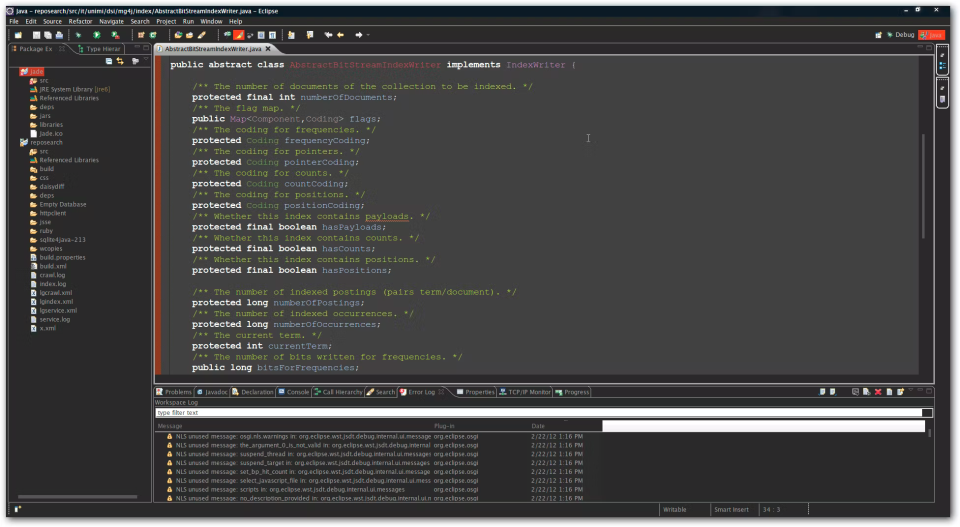
Eclipse IDE for Java developers is another well-established Java IDE in our list that continues to be popular among Java developers.
As a free Java IDE that’s also open-source, you can choose between a desktop or cloud version to suit your development style. The cloud version is particularly useful if you plan to code on the go!
You also get access to a plugin development environment where you can build out your own features or ‘mash up’ other plugins to tailor your IDE to you. This is pretty unique among Java IDEs.
On top of that, there’s a huge range of plugins on the Eclipse Marketplace to help you customize the IDE if you want to get it done quickly.
Although we’re focusing on its Java capabilities, Eclipse also supports many popular languages, like PHP, C++, JavaScript, and more. It is awesome if you’re a dev that uses multiple languages regularly.
Key Features
- Available for Linux, Mac, and Windows
- Wide variety of plugins, or you can build your own
- Support for popular languages like PHP, C++, and JavaScript
- Free and open source
- Supports Java 19
3. Apache NetBeans
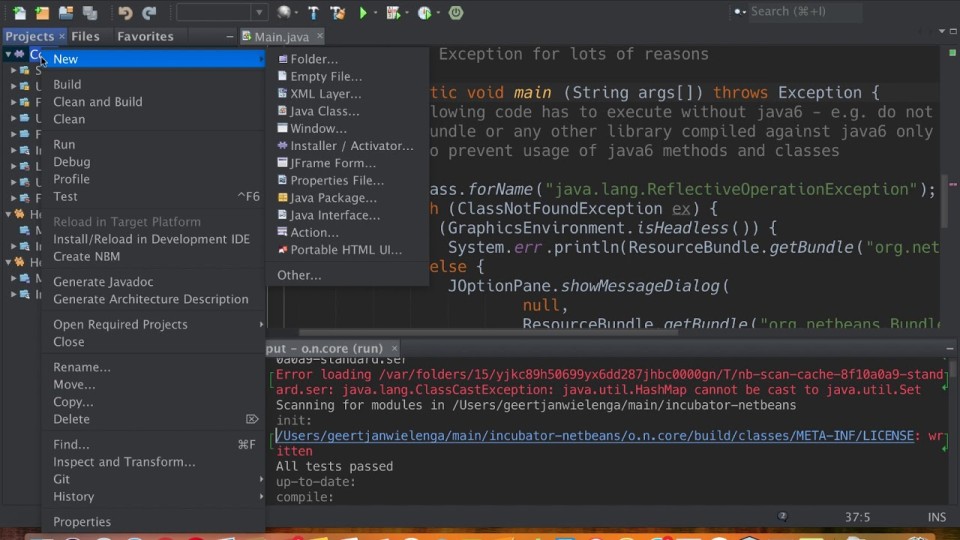
Not only is Apache NetBeans fun to say, but it’s an excellent open-source Java IDE that’s well respected in the Java development community.
Which is no wonder, given it is more than 25 years old. You can even get stuck in on GitHub by submitting pull requests or flagging any issues you might find.
With this Java IDE, you can take advantage of syntax highlighting, easy code refactoring, and a range of wizards to help you quickly and easily create apps in Java. There’s even a plugin portal to help you customize your dev environment, and it supports the Apache Ant project system.
Another great feature is support for JavaScript, PHP, HTML, and more, making this a solid choice for multi-language devs. It’s also available for all of the usual platforms, so you'll be good to go whether you’re a Windows user, a Linux fan, or you’re weighing up the best Java IDE for Mac.
Key Features
- Available for Linux, Mac, and Windows
- Wizards to quickly create Java apps
- Support for Apache Ant project system
- Support for JavaScript, PHP, HTML, and others
- Supports Java 19
Want to learn more about where Java is used? Check out our article on the best Java applications.
4. Android Studio
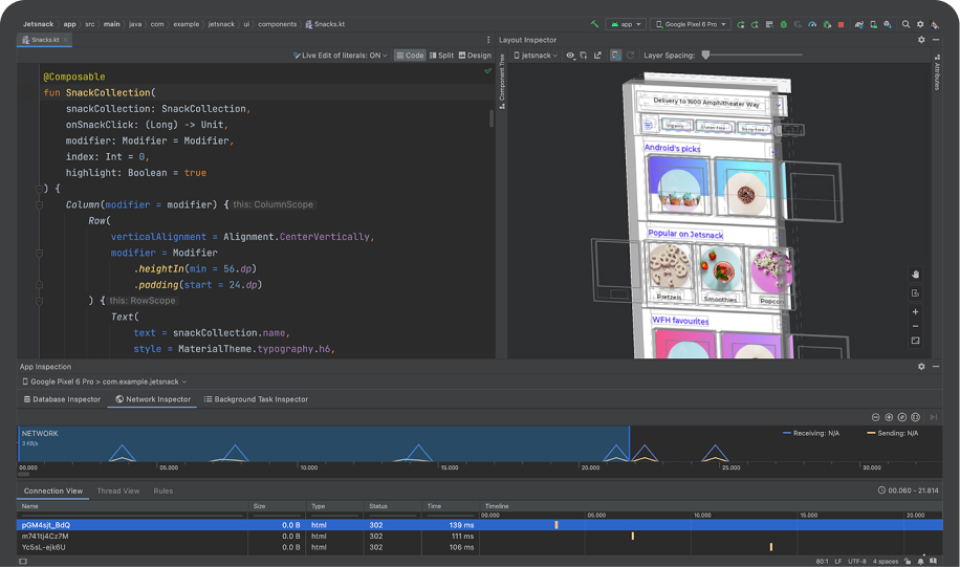
If you need a Java IDE for Android, Android Studio is a no-brainer. It’s even the official IDE for Android app development, which is quite the endorsement, not to mention it’s in the top 5 for IDEs across all languages.
Built using the Java code editor and dev tools from IntelliJ IDEA, Android Studio includes a range of Android app-specific features like a fast emulator, code templates, GitHub integration, linter for performance and version issues, integrated support for GCP (Google Cloud Platform), and the ability to apply changes to your app without having to restart it.
It also offers support for multiple APKs (Android Package Kit), Gradle build system, various levels of code completion, and a very capable debugger. Suffice it to say, there’s everything you need to produce professional Android apps with Java.
Key Features
- Available for Linux, Mac, Windows, and ChromeOS
- Official IDE for Android app development
- Includes an emulator, code templates, GitHub integration, and more
- Support for multiple APKs & Gradle build system
- Supports Java 11
5. AIDE - Android IDE
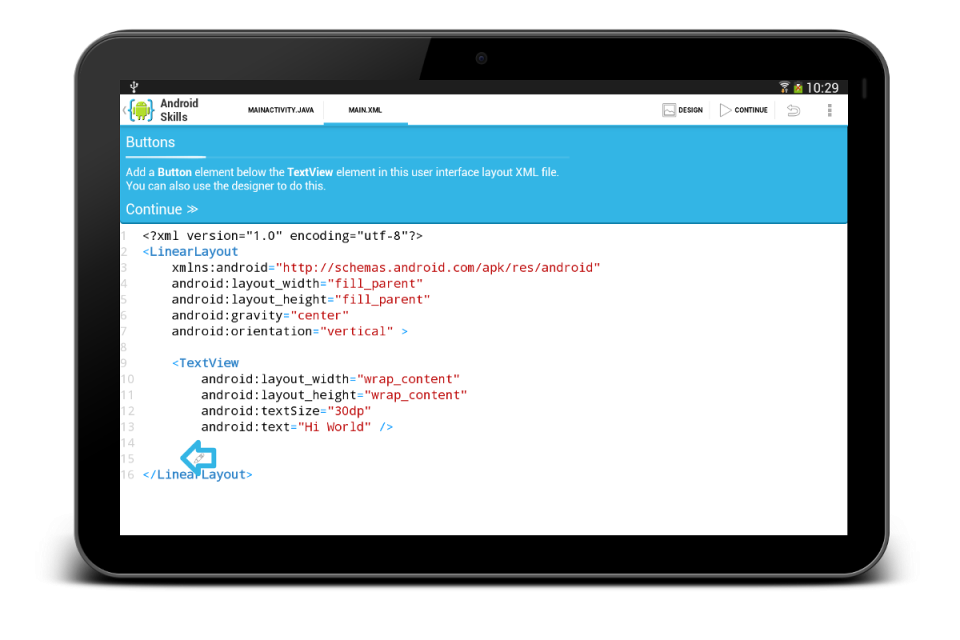
Another option for mobile Java developers, AIDE is unique in our list as it’s Java IDE that you can install directly on your mobile Android device.
You can even work in other popular languages like C, C++, JavaScript, and HTML/CSS. All in all, it’s a really neat way to build Android apps on an Android device.
Coming in free or paid options, there are some things to bear in mind when coding on a mobile device, whether that be the strength of your phone’s hardware or the fact that it might be tricky to type quickly. It’s also still tied to Java 7, so it’s not as up-to-date as Android Studio.
That aside, if you are intrigued, you can join the 2 million+ developers that have downloaded AIDE from the Play Store to take advantage of interactive lessons for new developers, web dev support, Dropbox and Git integration, refactoring, and smart code completion (helps with tricky typing!).
Key Features
- Mobile IDE for Android devices
- Supports C/C++, JavaScript, and HTML/CSS
- Interactive lessons, code refactoring, and smart completion
- Supports Java 7
6. Codenvy
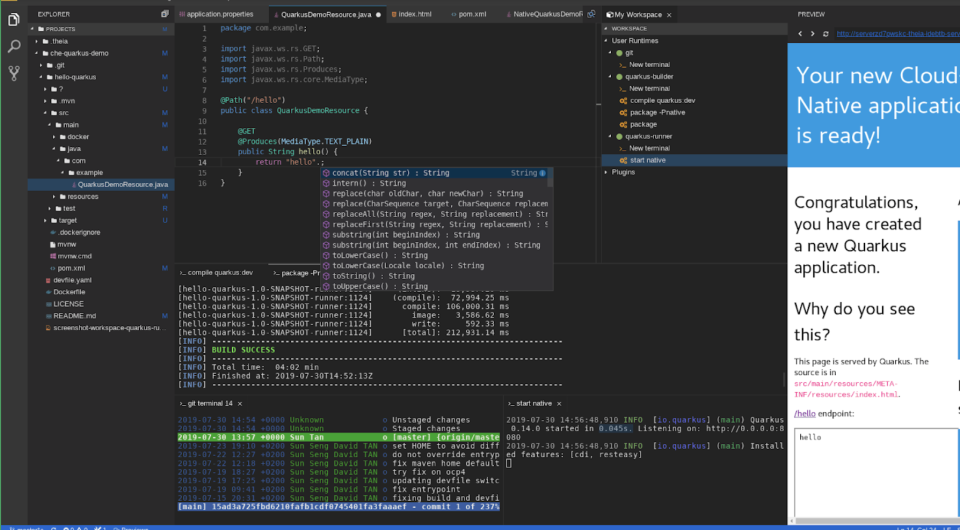
Are you looking for an online Java IDE? As a cloud-based Java IDE, Codenvy uses virtual workspaces to let developers contribute to projects without installing local software on their machines.
This Java web IDE is fantastic if you plan to code on the go or need to work in remotely distributed coding environments.
Built from the open-source Eclipse Che project, you can make the most of useful features like containerized workspaces, integrated version control with Git, vim & emacs key bindings, and more.
You also get the standard syntax highlighting, code completion, and refactoring features you’d expect from a modern Java IDE.
Unlike other Java IDEs on our list, Codenvy is essentially a SaaS (Software as a Service) product aimed at modern developers who need to contribute and share workspaces in a cloud environment.
Depending on your needs, you can choose from free or paid versions with a monthly fee. Typically, the paid options suit larger teams with multiple devs.
Codenvy also supports a range of programming languages, like PHP, Python, JavaScript, and more, which is fantastic if you find yourself wearing many language ‘hats’.
Key Features
- Cloud-based IDE
- Free or Paid options
- Virtual workspaces
- Containerized workspaces & version control
- Supports Java 17
7. BlueJ
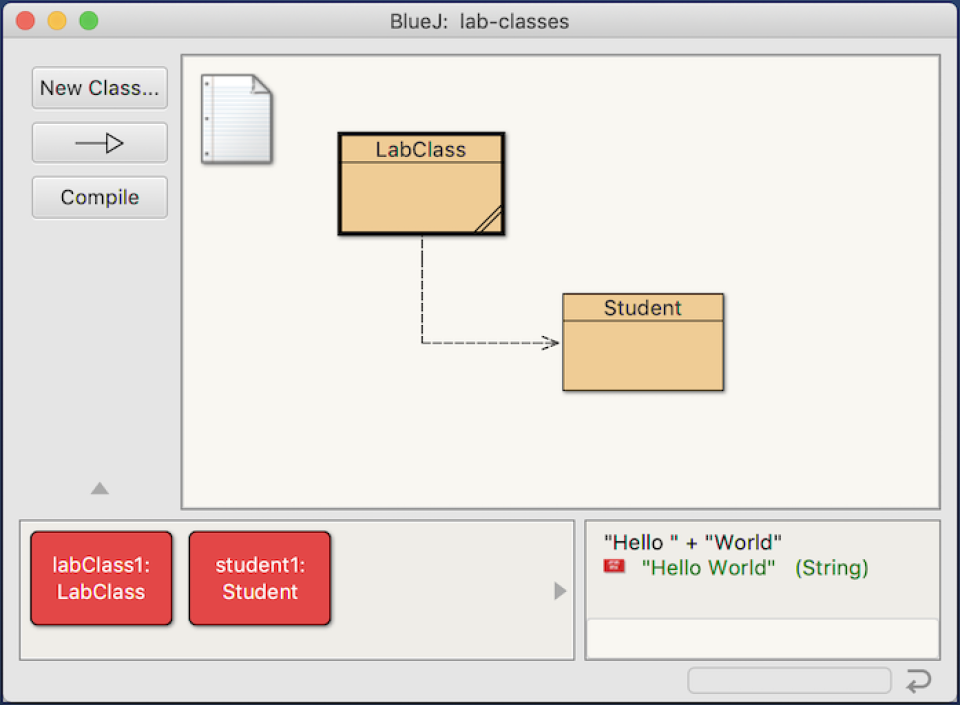
As one of the most beginner-friendly Java IDEs, BlueJ is a bit of a throwback but still a solid choice for Java beginners.
This free and open-source Java IDE started out with an education in mind, as it uses a unique visual approach for Object-Oriented Programming. Chances are, if you studied Java in college, you would have heard of BlueJ.
Nowadays, BlueJ tends to be used for developing smaller Java apps or Java beginners as it uses a smaller and less featured UI than pro tools like IntelliJ or Eclipse. There’s even a free textbook that you can use to learn BlueJ, further highlighting its educational roots!
This IDE is only for Java development, so there’s no support for other languages, plus it doesn’t offer auto-completion, which is actually a great idea as it helps you learn the code.
Overall, it’s an excellent choice if you’d like to visualize how Java classes connect and interact using integrated UML (Unified Modeling Language) diagrams.
It even uses scope coloring to enhance your Java understanding. Finally, if you prefer a portable Java IDE, you can run BlueJ from a USB drive.
Key Features
- Available for Linux, Mac, and Windows
- An interactive way to learn OOP
- Uses UML diagrams and scope coloring
- Free and open source
- Portable option via USB
- Supports Java 17
8. Greenfoot
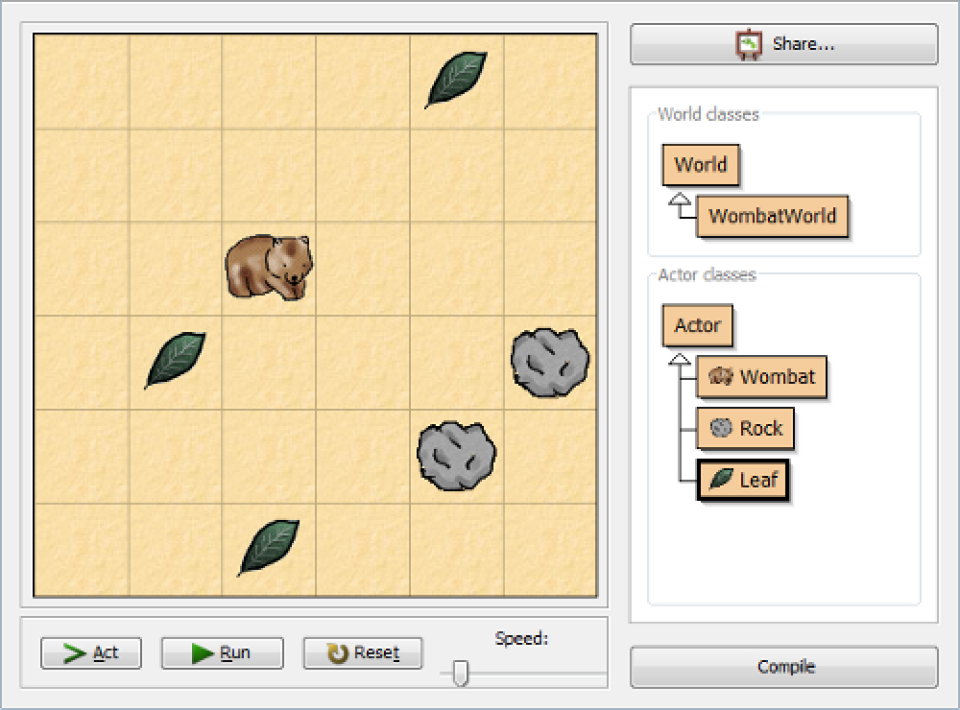
Continuing the theme of Java IDEs for students and beginners, Greenfoot is another excellent choice for Java newbies that want to learn OOP.
Much like BlueJ, this Java IDE offers a visual and interactive development environment, meaning you can reinforce core programming concepts with helpful visuals by way of ‘actors’ that demonstrate what your code is doing.
Despite being a beginner-focused Java IDE, it offers all of the features you’d expect, including project management, syntax highlighting, and code completion.
More advanced Java devs may find the UI to be too simple or even too playful, but for total newbies, it’s a great way to learn Java in a fun way. Plus, you can use this as an intro to the world of Java IDEs before graduating to some of the more professional options on our list.
Another bonus is the inclusion of Java tutorials on the Greenfoot website, which you can use to enhance your learning. And if you’re a teacher that wants to use this Java IDE in your own syllabus, there’s even a community for teachers to share ideas and thoughts.
Key Features
- Available for Linux, Mac, and Windows
- Beginner-friendly and interactive UI
- Completely free Java IDE
- Tutorials for Java beginners
- Supports Java 8
9. DrJava
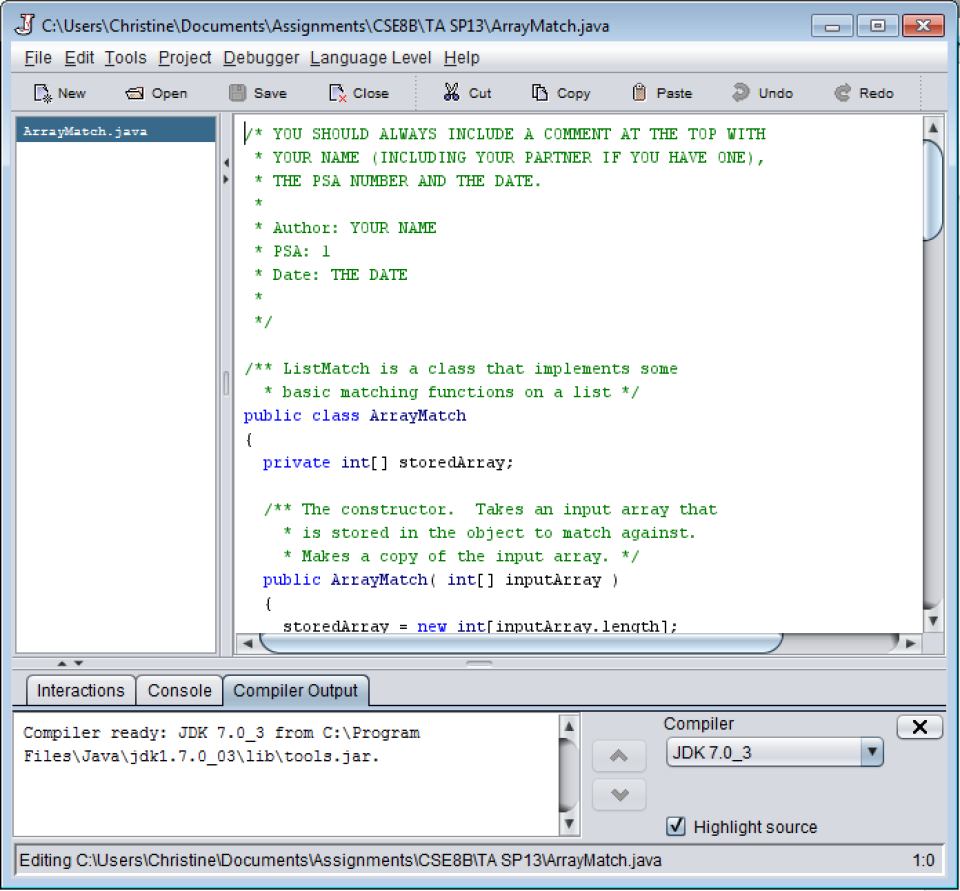
DrJava is another example of a simple, lightweight, and interactive Java IDE originally designed for students who want to learn Java. And much like BlueJ or Greenfoot, it’s completely free.
If you’re new to Java and programming in general, DrJava is a solid choice, as you’ll benefit from interactive code execution, which can really help you grasp programming concepts.
Advanced users will also appreciate standard features like syntax highlighting, a debugger, and testing with JUnit.
Being one of the older Java IDEs, you’ll have to use Java 8, which may exclude some of the newest features. However, it’s a great stepping stone to learning Java with an uncluttered UI. Plus, you can always transition to one of the more professional options like IntelliJ or Eclipse when you’re more confident with your Java skills.
Key Features
- Available for Linux, Mac, and Windows
- Completely free
- Interactive code execution
- Beginner-friendly UI
- Supports Java 8
10. JCreator
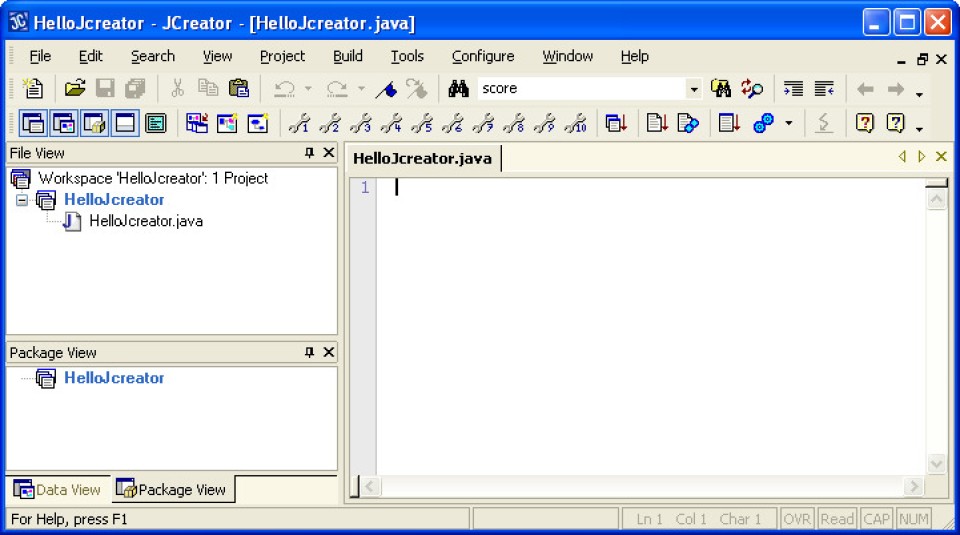
JCreator is another simple Java IDE, which is great for beginners that want to learn Java thanks to its simple UI. It’s one of the older Java IDEs at this stage, with support only extending to Java 8, meaning it won’t allow you to work with the latest and greatest features in Java.
Despite this, it’s a solid but basic way to write Java while taking advantage of helpful features like syntax highlighting, code folding, a customizable UI, and a range of wizards for important topics like classes or interfaces for OOP. It even offers project templates to boost productivity.
This is a Java IDE for Windows only, so Linux and Mac users must look at the other Java IDEs in our list. And given its older status, we’d only recommend the free version. If you’re ready to pay for an IDE, check out newer Java IDEs like IntelliJ.
Key Features
- Available for Windows
- Free or paid options (we recommend the free version)
- Simple & customizable UI
- Wizards & project templates
- Supports Java 8
Conclusion
And there you have it, the 10 best Java IDEs that can help you boost productivity and enhance your Java development experience in 2023.
If you’re a complete Java beginner, we’d recommend checking out the interactive and fun-to-use BlueJ or Greenfoot, as these beginner-friendly IDEs can be a great way to learn Java and OOP.
If you’re an experienced Java dev, you can’t go wrong with IntelliJ IDEA, Eclipse, or Apache NetBeans. Similarly, if you’re a mobile developer, you can choose Android Studio or AIDE if you like the sound of developing on your mobile device.
If you want an online IDE for Java programming, Eclipse IDE or Codenvy offer cloud-based options. And for super-simple IDEs with a non-cluttered UI, there’s DrJava or JCreator, which again can be great for newcomers to the Java language.
So whether you’re a Java beginner that’s looking to learn the Java language, a mobile app developer, or an enterprise-scale Java engineer, there’s something for you on our list.
Want to take your new Java IDE for a test drive? Check out our article on the best Java projects.
Frequently Asked Questions
1. Which Is the Best IDE for Java?
This depends on what you need from a Java IDE. If you’re learning Java or you’re new to programming, BlueJ or Greenfoot are great interactive Java IDEs for beginners.
Equally, if you’re more experienced, IntelliJ IDEA, Eclipse, or Apache NetBeans are excellent choices. Take a look at each Java IDE in our list; there’s bound to be one that is best for you.
2. What Does IDE Mean in Java?
A Java IDE (Integrated Development Environment) is a coding tool that can help you boost your productivity via various features like debugging, code completion, refactoring, syntax highlighting, and more.
3. Which Free Java IDE Is Best?
If you’re an experienced developer, you should try out the free versions of IntelliJ IDEA, Eclipse, and Apache NetBeans to see which one you click with.
If you’re a mobile developer, you cannot go wrong with Android Studio, and if you’re brand new to Java and programming, consider BlueJ or Greenfoot, as they’re both used in educational settings.
4. What Is Java IDE and JDK?
A Java IDE (Integrated Development Environment) is a coding tool that can help you boost your productivity via features like debugging, code completion, refactoring, syntax highlighting, and more.
JDK (Java Development Kit) is a cross-platform software development environment that bundles development tools, Java libraries, the Java Runtime Environment (JRE), and the Java Virtual Machine (JVM).
People are also reading:
- Best Java Courses
- Top 10 Java Certifications
- Best Java Books
- Top Java Programming Interview Questions
- Core Java Cheatsheet - Introduction to Programming in Java
- Difference between Java vs Javascript
- Best Way to Learn Java
- Features of Java
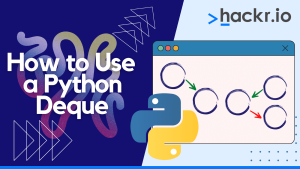
![7 Best AI Coding Assistants In 2023 [Free + Paid]](jpg/16952882603blllo1oza.jpg)
![30 Cool, Easy & Fun Python Projects + Source Code [2023]](png/1655865129yuz5v1mdab.png)

![The 14 Best TensorFlow Courses in 2023 [Free + Paid]](png/1624550510xonrryd0t0.png)
![10 Best Design Books for Design Students [Updated]](png/1642872008wcnbdsvf6q.png)
![I Ranked the Top 5 Best AI Image Generators [with Image Examples]](jpg/1682848644stltm9ynp6.jpg)

